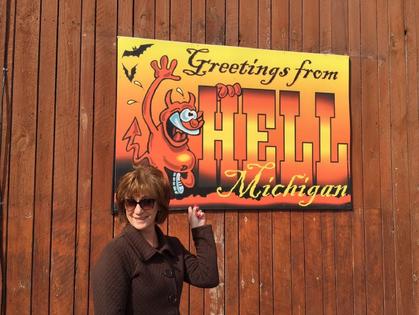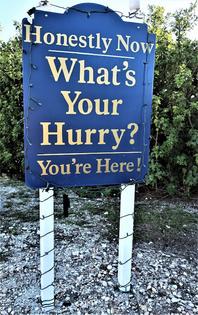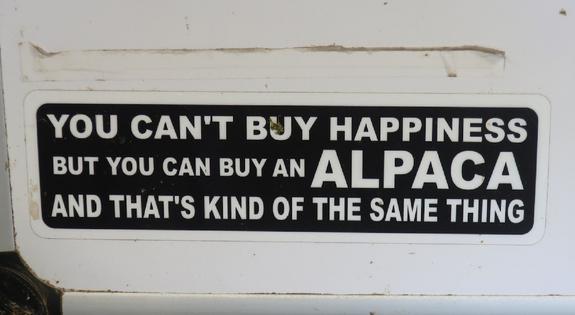Unusual Signs Lure Curious Travelers
In the 1830s a pair of German travelers visiting the United States alighted one morning from a stagecoach at a tiny community in Michigan and blinked in the hot sun, and one remarked to the other, "So schon hell" (So already bright). Locals with a sense of humor who overheard the comment immediately decided to call their then unnamed town Hell.
That's one theory about the origin of the designation of the miniscule hamlet (population about 270) that has created a cottage industry living up, or perhaps down, to its moniker. Others include the "hell-like" conditions (near-impregnable forests, boggy wetlands and swarming mosquitoes) that early explorers encountered and comments by housewife settlers that when their husbands imbibed home-distilled whiskey they had "gone to hell again."
Today visitors delight in posing for photographs before a sign that reads "Welcome to Hell, Michigan" and is adorned with a cartoon image of the devil. That is but one example of logos around the country that hint at the stories which prompted them. From wine to "Winter Texans" to "What's Your Hurry?," images can help pinpoint appeals and attractions of a destination in a few words or pictures.
Driving through the countryside surrounding Ithaca, New York, recently I gave in to my curiosity and turned down a driveway beside a placard bearing this message: "You can't buy happiness but you can buy an alpaca, and that's kind of the same thing." While I didn't end up purchasing one of those adorable creatures, I did return home with a fuzzy scarf, soft socks and stuffed animals made of alpaca fur for my grandchildren.
The Cabin View Alpaca Farm is home to about 50 of those lovable animals. Guests can lead them on a walk, feed them or simply stroll among the cute quadrupeds as the adults munch on grass and their offspring gambol like the youngsters they are.
It's fish and fishing that attract many people to visit locales in two Southern states. That explains the sign I spotted hanging on the wall of a restaurant in South Padre Island, Texas, which read: "Fish. Party. Repeat."
In addition to hoping to catch dinner at the end of a rod, visitors have a wide choice of other activities from which to choose. The A (antiquing) to Z (zip-lining) list offers something-for-everyone alternatives. Some part-time residents prefer to sun-bathe on the magnificent beaches. Locals refer to these seasonal guests as Winter Texans, who come from states farther north to seek a warmer clime.
The Florida Keys are home to what is billed as "the longest fishing pier in the world." It's an abandoned automobile bridge that is but one of countless places from which people drop a line in the water, hoping to hook a big one.
While the Keys have few outstanding bathing beaches, callers can get up-close views of wildlife at parks and refuges, enjoy spring and fall migration flyovers of more than 250 species of birds, and relax and rejuvenate in the laid-back atmosphere that pervades the island chain. That appeal was spelled out in a roadside message I saw that greets people with this question: "Honestly, now, what's your hurry? You're here!"
Food and drink are the focus of some placards that catch the attention of travelers. While driving through several Southeastern states, I decided to adhere to the advice I saw outside a restaurant to "Put some South in your mouth."
Throwing caution to the wind, I sought out unlikely parts of unlikely animals that where I come from would never grace -- or perhaps disgrace -- a dinner plate. Pickled pigs' feet, salted, smoked and cured in vinegar and spices, take up space on some menus and grocery store shelves. In South Carolina fried oinkers' ears are sought after as a delicacy.
West Virginia is squirrel country, and some of those little varmints end up fried and in stews. Nutria, a much larger rodent that invaded this country from South America, offers a low-fat, high-nutrition meat that can be served in soup, over salad or with pasta.
Alligators also have their gastronomic fans, especially in Florida. I ate like a local, sampling gator tail kabob, fried and in stew.
I'm not sure what wine would enhance fried alligator, but I assume that the vintners at the Briede Family Vineyards in Winchester, Virginia, might. That estate, located along the Shenandoah Valley Wine Trail, uses hybrid grapes and follows sustainable methods. Before going there, I wasn't aware that -- as a placard at the vineyard informed me -- it takes 600 grapes to fill a bottle of wine.
Patrons who sidle up to the bar at the Prohibition Museum in Savannah, Georgia, are more likely to imbibe libations similar to those that were popular a century ago. These include concoctions that were put together by bartenders seeking to mask the inferior taste of poor-quality alcohol that sometimes was laced with questionable additives.
After strolling through the exhibits, which immerse guests in realistic scenes from about 1920 to 1933, museumgoers knock on a nondescript door. A small slot beneath a sign that warns "Keep Out" slides open, and a menacing voice asks, "Who sent you?" Any response will suffice, and once inside visitors find themselves in a realistic re-creation of a secret speakeasy, complete with jazz music and friendly mixologists who are happy to create potions that offer memories of decades past.
----
WHEN YOU GO
gotohellmi.com
cabinviewalpacas.com
myspi.org
fla-keys.com
briedevineyards.com
visitsavannah.com
========
Victor Block is a freelance writer. To read features by other Creators Syndicate writers and cartoonists, visit the Creators Syndicate website at www.creators.com.
Copyright 2025 Creators Syndicate, Inc.



































Comments